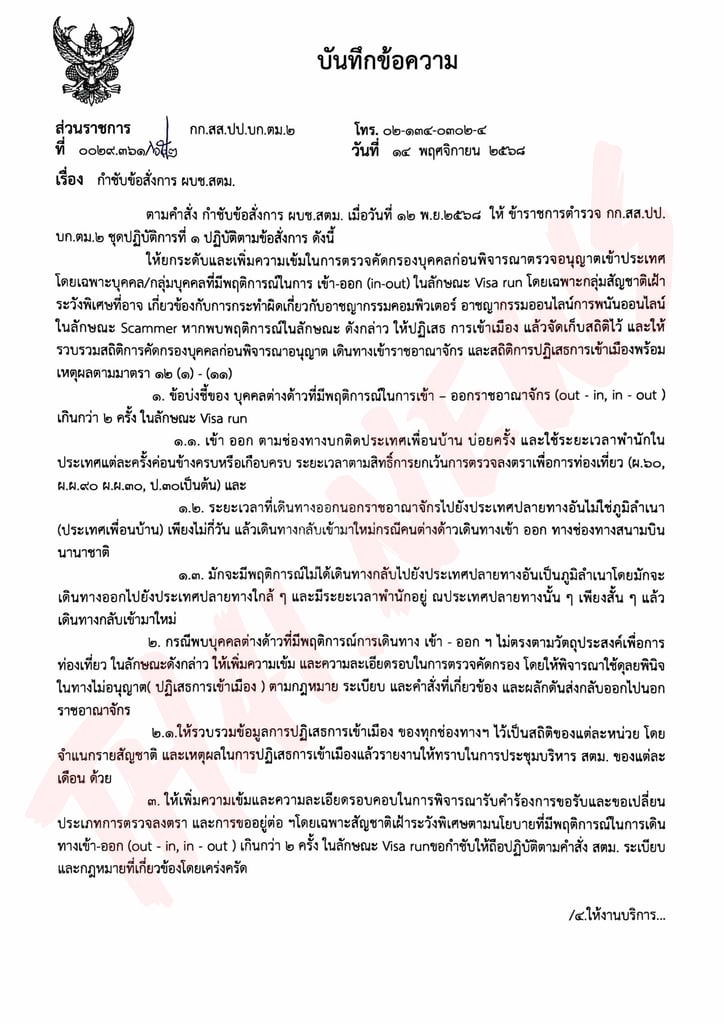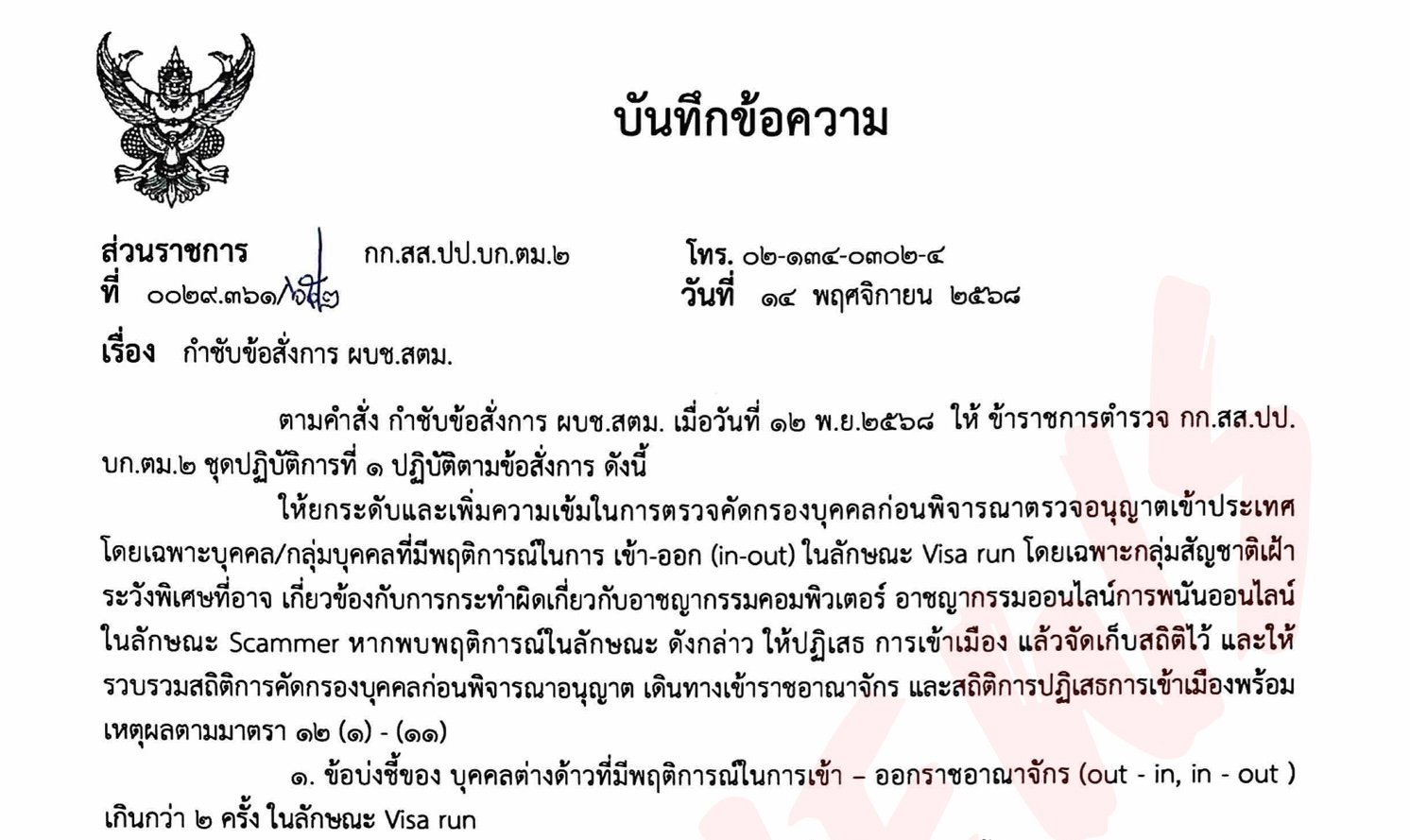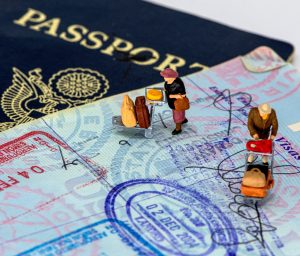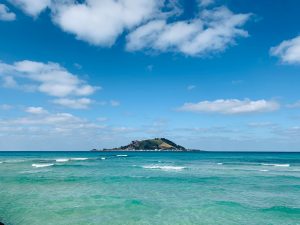In mid November 2025 the Immigration Bureau circulated an internal memo to officers around the country. The instruction is clear: raise the level of screening on foreigners who repeatedly enter and leave Thailand and stop people from using short stay visas and visa exemptions as a way to live in the country long term.
If you have been relying on back to back visa exemptions, tourist visas and quick hops to neighboring countries, this directly affects you.
What did Immigration actually say?
The memo orders officers to:
- Increase scrutiny at the border
Officers must carefully screen people whose travel pattern is repeated in-out or out-in, especially:- More than 2 entries that look like visa runs
- Stays that always last almost the full allowed period on each entry
- People who do not go back to their home country, but only hop to nearby countries for a few days and come back
- Use this pattern as a red flag
When a foreigner’s travel history does not match genuine tourism, officers are told to:- Treat the case as suspicious
- Refuse entry where appropriate
- Record statistics and reasons for refusal every month
- Be stricter with extensions and in country changes
Immigration offices are instructed to:- Tighten approval of tourist extensions
- Be more strict when people try to change visa type inside Thailand
- Pay special attention to nationalities under “special monitoring” that have multiple visa run style entries
- Cross check data more actively
Officers are told to:- Compare TDAC and online data with real stays
- Use hotel and house reporting (TM30, section 38) to see where people actually live
- Share data with other ministries and foreign governments in some cases
- Crack down harder on overstay and illegal work
The memo specifically mentions:- Foreigners working without a work permit, especially in restricted occupations
- People staying beyond their permitted period (overstay)
So what has really changed?
Some of this has always been in the law, but in practice enforcement depended a lot on the individual officer and location. Many people could chain visa exemptions or tourist visas for years with only occasional questions.
What changed now is:
- The pattern is officially written down as a problem.
Repeated short trips in and out, long stays on each entry and no return to your home country are now explicitly described as indicators for refusal. - Officers are instructed to enforce it and report numbers.
Once Immigration HQ asks for statistics, front line officers are under pressure to actually refuse more entries that fit these patterns. - Extensions and in country changes are no longer “soft options”.
People who arrive on exemption or a tourist visa and then try to extend or switch to another visa type in Thailand will see more checks, especially if their travel history shows they have already been living here.
In short: the door has not been slammed shut, but it is no longer “business as usual” for long term living on visa runs.
How this affects visa runs
If your pattern looks like this:
- 60 days in Thailand on exemption ( and possibly another 30 day extension )
- Quick trip to a neighboring country for 2 or 3 days
- Back for another 60 days
- Repeat again
then you are exactly the type of traveler that the memo is targeting.
You may face:
- Detailed questioning at the border
- Shorter permission to stay than expected
- Being told to return to your home country next time
- In the worst case, refused entry and sent back on the next flight
What about expats trying to live long term?
For people who genuinely want to live in Thailand long term, the message is:
Stop using repeated exemptions and visa runs as your main strategy.
Get an appropriate long stay visa or status.
Examples of safer long term paths include:
- Non O based on marriage or supporting Thai family
- Retirement visas for those who qualify by age and funds
- Non B and work permit for employment or running a company
- Education visas for genuine study
- Long Term Resident (LTR) and other special schemes for those who meet the criteria
Immigration wants long stayers to be on the correct visa for their situation, not living here permanently as “tourists”.
Who is most at risk?
Based on the memo, higher risk groups include:
- People with 3 or more visa exempt or tourist entries in a short time
- People who always stay for almost the full length on each entry
- Travelers who only hop between Thailand and nearby countries without returning home
- Anyone suspected of working online or offline without a work permit
- Expats who have already been warned at the border in the past
Even if you are from a so called low risk passport country, if your pattern looks like you are living here on visa runs, expect more questions.
What should you do now?
If you want to keep Thailand as a long term base:
- Stop relying on visa runs as your main plan.
One or two exemptions is fine for genuine tourism. Beyond that, you should assume increased risk. - Move to a proper long stay option as soon as you can.
Look at Non O, Non B, retirement, ED or other options that match your real situation. - Keep your history clean.
Avoid overstay, avoid working without a permit and avoid obvious “hop out for 2 days, back again” patterns. - Get advice for your specific case.
Immigration policy is being enforced more consistently, but there is still complexity and local practice. A proper assessment of your passport, history and goals is important.
Memorandum Translation
Government unit: Investigation and Suppression Sub-Division, Immigration Division 2
Date: 14 November 2568 (2025)
Subject: Reiterating the orders of the Commissioner of the Immigration Bureau
In reference to the directive reiterating the orders of the Commissioner of the Immigration Bureau dated 12 November 2568, all police officers of the Investigation and Suppression Sub-Division, Immigration Division 2, Operational Team 1, are ordered to act as follows:
- Raise the level of and increase the strictness of screening persons before granting permission to enter the Kingdom, especially persons or groups of persons whose behavior shows a pattern of entering and leaving (in-out) in the form of “visa runs”. Particular attention must be paid to nationalities designated as requiring special monitoring that may be involved in computer crime, online crime or financial fraud in the form of scammers. If such behavior is found, entry to the country shall be refused, statistics shall be recorded, and statistics on screening prior to granting permission to enter the Kingdom and on proactive operations shall be compiled, together with the reasons under section 12 (1), (2), etc. of the Immigration Act. 1.1 Indicators of foreign nationals whose behavior shows a pattern of entering and leaving the Kingdom (out-in, in-out) more than two times in the form of visa runs include: 1.1.1 Entering and leaving frequently through border checkpoints with neighboring countries, and on each entry staying for almost the full period, or the full period, allowed under the right of stay granted by tourist visas or visas for tourism (T.90, P.P.90, P.P.30, P.30, etc.). 1.1.2 The time spent outside the Kingdom in another destination country which is not the person’s home country (for example a neighboring country) is only a few days, after which the person returns to Thailand again. This applies in cases where the foreigner is travelling in and out through international airports. 1.1.3 There is a pattern of not returning to the home country, but instead travelling only to nearby third countries and staying there only briefly, then returning to Thailand again.
- When foreigners are found whose pattern of travel in and out does not correspond with the purpose of tourism, in the manner described above, screening must be increased in strictness and carried out with particular care. Doubtful circumstances should be considered as grounds for refusing entry (denial of admission) under the relevant laws, regulations and orders, and such persons are to be removed from the Kingdom. 2.1 Data on immigration control operations at every checkpoint shall be compiled as statistics for each unit, showing the number of persons by nationality and the reasons for refusal of entry. These statistics are to be reported at the monthly executive meeting of the Immigration Bureau.
- Increase strictness and thoroughness in considering applications for visas, applications to change visa category and applications for extensions of stay, especially for nationalities under special monitoring whose pattern of entering and leaving (out-in, in-out) exceeds two times in the form of visa runs, in accordance with the orders of the Immigration Bureau and all relevant laws and regulations.
- All alien-service sections of every unit shall compile information on cases where permission is not granted in relation to foreign nationals who submit applications for visas, applications to change visa type or applications to extend stay which do not meet the criteria and conditions of each unit. The data shall be classified as follows: 4.1 Cases where permission is not granted on the date the application is submitted (within seven days). 4.2 Cases where permission is not granted at the end of the thirty-day consideration period. 4.3 Cases where permission already granted is later revoked. This information must be broken down by nationality and by reason for refusal or revocation, and the compiled data from all units shall be reported at the monthly executive meeting of the Immigration Bureau.
- Check notifications of residence of foreigners submitted by house owners, heads of households or possessors of premises or hotels that accommodate foreigners under section 38, especially in units located in tourist areas or in areas with a large number of foreign residents. These inspections must be carried out strictly and continuously. Where possible, online notifications of residence in the TDAC system shall be compared with the foreigners actually staying at the premises, in order to increase the effectiveness of inspection and law enforcement.
- Compile data on foreign nationals of the nationalities designated for monitoring under policy, particularly those coming from KK Park on the Myawaddy side in Myanmar, and compare them with data on foreign nationals whose behavior shows visa-run patterns under tourist-visa exemption (T.90). Then check how many of these persons are currently in the country, broken down by province, in order to verify whether their distribution within the country corresponds with actual information and intelligence. If behavior meeting the criteria for revocation is found, revocation shall be carried out and the person shall be controlled and removed from the Kingdom without delay.
- Compile information on Thai nationals travelling out of the country, and on passengers at international airports whose destinations are clearly specified target countries, in order to set measures for dealing with Thai nationals who intend to travel to those target countries. Coordination shall be made with immigration checkpoints and with the Ministry of Labour to conduct interviews and questioning in order to prevent such travel, and the Ministry of Foreign Affairs shall be notified so that information on Thais who have travelled out can be sent to the destination countries, requesting cooperation in refusing their entry and residence in those countries.
- Intensify crackdowns on crime related to offences committed by foreign nationals and increase the results in arresting foreign nationals who commit offences by working without permission (especially cases of performing occupations reserved for Thai nationals or prohibited occupations) and foreign nationals who remain in the Kingdom beyond the permitted period (overstay), especially foreign nationals of the nationalities designated for monitoring under policy. All units shall be deemed to have received and acknowledged this simultaneously. If any unit acts contrary to these instructions, a detailed explanatory report must be made.
For acknowledgment and compliance with this order.
Inspector, Investigation and Suppression Sub-Division
Immigration Division 2













































Be First to Comment